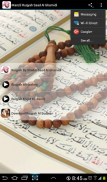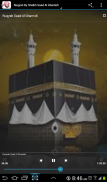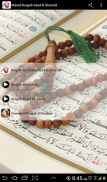





Ruqya MP3 By Saad Al Ghamidi

Descrição de Ruqya MP3 By Saad Al Ghamidi
Ruqya refers to the recitation of some specific verses from the Holy Qur’an or to make supplication using words that are mentioned in the Hadith of Prophet Mohammad (saw). Ruqya can be described as a spiritual healing prayer in which verses from the Holy Qur’an or the supplications from the Prophet are used in order to heal oneself or somebody else from sickness and evil eye.
Ruqya is a Sunnah of our beloved Prophet Mohammad (saw). He used to recite ruqyah for himself whereas some of his companions (Sahaaba) used to recite ruqyah for themselves. We know for a fact that the Holy Quran has been sent down on earth as a guide and cure to all human beings. Allah (swt) has said in the Quran that Allah (swt) says in the Quran, ‘We send down (stage by stage) in the Quran that which is a healing and mercy to those who believe’.
Allah (swt) says in the Quran ‘If a suggestion from Satan assails thy (mind), seek refuge with God; for He heareth and knoweth (All things), and ''And when I am ill, it is He who cures me’. Allah (swt) also says in the Quran, ‘We send down from the Quran that which is a healing and mercy for those who believe”.
These verses from the Quran ascertain that Allah (swt) has told his followers to use the words from his Quran to cure us of all evils and illnesses. This treatment is known as ruqyah.
There is ample evidence from the ahadith that prove the significance of ruqya in Islam.
Sahih Bukhari Hadith (Volume 7, Number 634) narrated Aisha (RA) Prophet Mohammad (saw) ordered me or somebody else to do Ruqya in case there was a danger from an evil eye.
Sahih Bukhari Hadith (Volume 7, Number 631) Narrated 'Aisha (RA): During the Prophet's (saw) serious illness, he used to recite the Mu'auwidhat (Surat An-Nas and Surat Al-Falaq) and then blow his breath over his body. When his pain became intense, I used to recite those two Suras and blow my breath over him and make him rub his body with his own hand for its blessings." (Ma'mar asked Az-Zuhri: How did the Prophet (prayers and peace be upon him) use to blow? Az-Zuhri said: He used to blow on his hands and then passed them over his face.) Hazrat Ayesha (ra) also said that, ‘Prophet Mohammad (saw) instructed me and everybody else to do Ruqya in case of danger from evil eye’
The significance of Surah Fatiha in ruqyah healing:
Besides being called Al-Hamd, As-Salah, Ash-Shifa and Umm al-kitab Surah Fatiha is also called Ar-Ruqyah (remedy), because there is the narration in the Sahih of Abu Sa`id telling the story of a Sababa/ Companion of the Prophet (saw) who used Al-Fatihah as a cure for the tribal chief who was stung by a scorpion. Later on, Prophet Mohammad (saw) said to a Companion,
"How did you know that Surah Fatiha is a Ruqyah?"
Some commentators opined that the focal point of healing powers of Surah Fatiha is in the power and blessings of the words: “Thee we worship(iyyaka na`budu), and Thy help we seek (iyyaka nasta`in)” The words, worship(na’budu) and help (nasta`in) have been understood to be the strongest elements for the most effective cure. In these lines we directly plead for help from the Allah (swt) (al-Shafi) whom we completely trust for recovery. This is why surah al-fatihah is one of recommended surah to be recited for ruqyah.
In Bab Fadl Fatihat al-Kitab of Kitab Fada`il al-Quran, Imam Bukhari reported that: Narrated Abu Sa'id Al-Mu'alla, ‘Once when I was praying the Prophet (saw) called me but I did not respond to his call. Later on I said, "O Allah's Apostle! I was praying." He said, "Didn't Allah say: 'O you who believe! Give your response to Allah (by obeying Him) and to His Apostle when he calls you'?" (8.24). He then said, "Shall I not teach you the most superior Surah in the Qur'an?" He said, '(It is), 'Praise be to Allah, the Lord of the worlds. '(i.e., Surat Al-Fatiha) which consists of seven repeatedly recited Verses and the Magnificent Qur'an which was given to me.
Ruqya refere-se a recitação de alguns versos específicos do Alcorão ou fazer súplica usar palavras que são mencionados no Hadith do Profeta Mohammad (saw). Ruqya pode ser descrito como uma oração de cura espiritual em que versículos do Alcorão ou as súplicas do profeta são usadas a fim de curar a si mesmo ou outra pessoa da doença e mau-olhado.
Ruqya é um Sunnah do nosso amado Profeta Mohammad (saw). Ele costumava recitar ruqyah para si mesmo que alguns de seus companheiros (Sahaaba) costumava recitar ruqyah para si próprios. Sabemos que para um fato que o Alcorão Sagrado foi revelado na terra como um guia e cura para todos os seres humanos. Allah (swt) disse no Alcorão que Allah (SWT) diz no Alcorão: "Enviamos para baixo (passo a passo) no Alcorão que o que é uma cura e misericórdia para os que crêem".
Allah (SWT) diz no Alcorão "Se uma sugestão de Satanás assalta a tua (mente), procurar refúgio com Deus; pois Ele ouve e conhece (todas as coisas), e '' E quando eu estou doente, é ele que me cura ". Allah (SWT) também diz no Alcorão ", enviamos do Alcorão que o que é uma cura e misericórdia para aqueles que acreditam".
Estes versículos do Alcorão verificar que Allah (swt) disse a seus seguidores para usar as palavras de seu Alcorão para curar-nos de todos os males e doenças. Este tratamento é conhecido como ruqyah.
Há ampla evidência do ahadith que comprovem a importância de ruqya no Islã.
Sahih Bukhari Hadith (Volume 7, Número 634) narrou Aisha (RA) profeta Maomé (saw) me ou alguém para fazer Ruqya no caso de haver um perigo de um olho mau ordenada.
Sahih Bukhari Hadith (Volume 7, Número 631) Narrado "Aisha (RA): Durante uma doença grave do (saw) do Profeta, ele costumava recitar o Mu'auwidhat (Surat An-Nas e Surat Al-Falaq) e, em seguida, explodir o fôlego sobre seu corpo. . Quando a dor tornou-se intensa, eu costumava recitar estes dois Suras e soprar o fôlego sobre ele e fazê-lo esfregar o corpo com sua própria mão para suas bênçãos "(Ma'mar perguntou Az-Zuhri: Como o Profeta (e orações ? a paz esteja com ele) usar para explodir Az-Zuhri disse: Ele costumava explodir em suas mãos e, em seguida, passou-os em seu rosto) Hazrat Ayesha (ra) disse ainda que, "Profeta Mohammad (saw) me e todos os outros instruído. fazer Ruqya em caso de perigo de mau olhado '
O significado de Sura Fatiha na cura ruqyah:
Além de ser chamado Al-Hamd, As-Salah, Ash-Shifa e Umm al-Kitab Sura Fatiha também é chamado de Ar-ruqyah (remédio), porque não há a narração no Sahih de Abu Sa`id contando a história de um Sababa / companheiro do Profeta (saw) que usou Al-Fatiha como uma cura para o chefe tribal que foi picado por um escorpião. Mais tarde, o profeta Maomé (saw) disse a um companheiro,
"Como você sabia que Sura Fatiha é um ruqyah?"
Alguns comentaristas opinaram que o ponto focal de poderes de cura da Sura Fatiha está no poder e bênçãos das palavras: "Te adoramos (iyyaka na`budu), e Tua ajuda buscamos (iyyaka nasta`in)" As palavras, adoração (na'budu) e ajuda (nasta`in) foram entendidos como sendo os elementos mais fortes para a cura mais eficaz. Nestas linhas suplicamos diretamente para a ajuda do Allah (SWT) (al-Shafi) quem nós confio completamente para a recuperação. É por isso que surata al-Fatiha é um dos surata recomendado para ser recitado para ruqyah.
Em Bab al-Fadl Fatihat Kitab de Kitab al-Quran Fada`il, Imam Bukhari relatou que: Narrou Abu Sa'id Al-Mu'alla, 'Uma vez, quando eu estava orando, o Profeta (saas) me chamou, mas eu não responder ao seu chamado. Mais tarde, eu disse: "Ó Deus do Apóstolo! Eu estava rezando." Ele disse: "Não Allah dizer:" Ó vós que credes Dê a sua resposta a Deus (por obedecê-lo) e Seu Apóstolo quando ele te chama '" (8,24). Ele então disse: "Eu não vos ensinará a surata mais superior no Alcorão?" Ele disse: "(Ele é)," Louvado seja Deus, o Senhor dos mundos. "(ou seja, Surat Al-Fatiha), que consiste em sete repetidamente recitou versos e de Magnificent Alcorão que foi dado a mim.
























